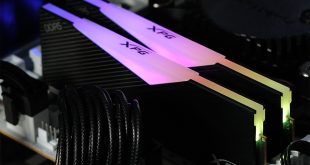Firmly targeting 1440p gamers, today marks the launch of AMD's new RX 7800 XT graphics card. With an MSRP of $499, or £479.99 for UK buyers, it's positioned between the RTX 4060 Ti 16GB and the RTX 4070, and comparisons are generally favourable against those two GPUs.
That starts with the raw performance. The RX 7800 XT is a highly capable GPU, delivering at least 64FPS in every single game we tested at 1440p using Ultra image quality, including demanding titles such as A Plague Tale: Requiem and Cyberpunk 2077. It's 7% faster on average than the RTX 4070 at this resolution, delivering performance that's at least 10% better in four of the twelve games tested, while it was only slower than the Nvidia GPU in one of them. It's an entirely different class of product to the RTX 4060 Ti 16GB too, despite launching at the same price – the 7800 XT is 44% faster on average.
It's also a decent entry-level 4K card. Granted it won't get you a locked 60FPS in every game, for those heavier titles you may need to drop down to High settings or enable upscaling, but the likes of Forza Horizon 5, God of War and Resident Evil 4 all played above 60FPS with high levels of fidelity.
Ray tracing is a different beast, but I'm relatively surprised with how well the RX 7800 XT does in this regard. Granted, it does get monstered by Nvidia in the likes of Cyberpunk 2077 (especially using RT Overdrive) and Ratchet and Clank, but on average performance is in-line with the 4060 Ti 16GB and even above it by margins of 10-20% in Control and F1 23. It does fall short of the RTX 4070, by about 25% on average, and we maintain that an Nvidia card is the clear choice if ray tracing is high on your list of priorities… but it's not like the 7800 XT is awful when it comes to enabling the technology.
One thing our testing has shown us today however, is that the RX 7800 XT is not really a successor to the RX 6800 XT. At least, it shouldn't be thought of as one by a prospective customer. The reality is these two GPUs only share the same name, everything else is quite different. The RX 7800 XT launches with an MSRP that's £120 lower and it uses a lower-tier GPU (Navi 32 instead of Navi 31), but primarily it's just not much faster at all than its supposed predecessor, with just a 3% advantage at 1440p. AMD has certainly made life difficult for itself in this regard, naming it simply the ‘RX 7800' would make a lot more sense given it's really not much of an upgrade over the RX 6800 XT.
That's also the case when looking at power draw and performance per Watt. At 1440p the RX 7800 XT draws about 250W on average, delivering an efficiency gain of 26% against the RX 6800 XT, but it's only 8% more efficient than the RX 6800 non-XT, considering it's not a whole lot faster for fairly similar power draw. As we've known for a while now, Nvidia's Ada architecture is the efficiency champion of this generation, with the 7800 XT delivering performance per Watt that's 23% lower than the RTX 4070.
Still, when we consider the raw performance on offer for the price tag, the RX 7800 XT is a relatively impressive card. That said, I don't think the RTX 4070 would need to get much cheaper to give you pause for thought. Right now it's £90 more expensive, but with DLSS 2 generally superior to FSR, and DLSS 3 having launched last year while FSR 3 is not yet available, that definitely gives Nvidia an edge. Factor in the lower power draw, significantly increased efficiency and generally superior ray tracing performance, and I think the RTX 4070 only needs to get within £50-or-so of the RX 7800 XT to make it a much tougher fight for Radeon.
As things stand now though, I believe most would lean towards the 7800 XT in a straight shoot-out, simply due to the fact it offers superior rasterisation performance and an extra 4GB of VRAM, all while coming in £90 cheaper. On the other hand, it crushes the RTX 4060 Ti 16GB while only costing £50 more, a sad indictment on the state of Nvidia's current-gen GPU in the £400-500 range.
It's certainly a valid point to make that RX 7800 XT itself doesn't amaze, offering a relatively uninspiring generational uplift while efficiency remains largely unimproved. Its successes come mainly due to its competition setting the bar so low in this market segment, something clearly epitomised by the RTX 4060 Ti 16GB. The RX 7800 XT is our new go-to recommendation in the the £450-500 price bracket, but think of it as ‘the least worst', rather than a genuinely impressive product.
We don't yet have a buy link but the AMD RX 7800 XT is due on sale today, September 5th, with a UK MSRP of £479.99.
Discuss on our Facebook page HERE.
Pros
- Very capable 1440p performance.
- Slightly faster than the RTX 4070 and crushes the RTX 4060 Ti 16GB in rasterisation.
- Cost per frame leader for this market segment.
- Ray tracing, although not great, is improved versus RDNA 2.
- 16GB VRAM is solid at this price point.
- Reference card runs fairly cool and quiet.
Cons
- Not a huge leap forward from the RX 6800 (+17%).
- Poor choice of name, is barely faster than the RX 6800 XT.
- Nvidia has the edge for ray tracing, particularly in showcase titles like Cyberpunk 2077 with path tracing.
- Only small improvements to efficiency versus RDNA 2 and it's still well behind the 40-series.
KitGuru says: If you're looking to spend around £450-500 on a new graphics card, the RX 7800 XT makes the most sense to us. The RTX 4070 could have a thing or two to say about that with a price cut, but right now the mid-range is swinging back towards AMD.
 KitGuru KitGuru.net – Tech News | Hardware News | Hardware Reviews | IOS | Mobile | Gaming | Graphics Cards
KitGuru KitGuru.net – Tech News | Hardware News | Hardware Reviews | IOS | Mobile | Gaming | Graphics Cards




